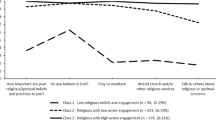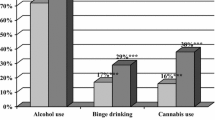Abstract
Among the African American community, there exist many health disparities which warrant greater examination through the practice of social work. The aim of the present research was to explore the impact of religiosity on substance abuse and obesity among African American populations by employing a systematic review of the current body of literature on this subject. While many of the studies reviewed found at least a weak relationship between religiosity and obesity, such results were not consistent across all materials examined. Among those studies that found a correlation between these factors, many demonstrated that religiosity had a positive impact on substance abuse and obesity. A discussion of the implications of these findings is submitted as a means of illuminating the significance of all research findings that were examined. Limitations such as more standardized criteria for inclusion of research material are identified and discussed. Implications for future research are presented to promote the advancement of future efforts in this area research.
Similar content being viewed by others
Change history
10 November 2017
The original version of this article unfortunately contained a mistake in the author names. The co-author names should be David Meetze and Ronald Whicker Jr. instead of David Meetz and Ronald Wicker. The original article has been corrected.
References
Bliss, D. L. (2009). Ethnic differences in spirituality in a sample of men and women in diverse substance abuse treatment settings: Implications for practitioners. Journal of Ethnicity in Substance Abuse, 8(4), 413–430. doi:10.1080/15332640903327583.
Bopp, M., Wilcox, S., Laken, M., & McClorin, L. (2009). Physical activity participation in African American churches. Journal of Cultural Diversity, 16(1), 26.
Braman, D. (2007). Doing time on the outside: Incarceration and family life in urban America. Ann Arbor, MI: University of Michigan Press.
Cawley, J., & Meyerhoefer, C. (2012). The medical care costs of obesity: An instrumental variables approach. Journal of Health Economics, 31, 219–230. doi:10.1016/j.jhealeco.2011.10.003.
Cooper, H. M. (2010). Research synthesis and meta-analysis: A step-by-step approach (4th ed.). Los Angeles, CA: SAGE Publications Inc.
Dodor, B. (2012). The impact of religiosity on health behaviors and obesity among African Americans. Journal of Human Behavior in the Social Environment, 22(4), 451. doi:10.1080/10911359.2012.664977.
Farmer, A. Y., Sinha, J. W., & Gill, E. (2008). The effects of family religiosity, parental limit-setting, and monitoring on adolescent substance use. Journal of Ethnicity in Substance Abuse, 7(4), 428–450. doi:10.1080/15332640802508176.
Fife, J. E., Sayles, H. R., Adegoke, A. A., McCoy, J., Stovall, M., & Verdant, C. (2011). Religious typologies and health risk behaviors of African American college students. North American Journal of Psychology, 13(2), 313.
Fowler, P. J., Ahmed, S. R., Tompsett, C. J., Jozefowicz-Simbeni, D. H., & Toro, P. A. (2008). Community violence and externalizing problems: Moderating effects of race and religiosity in emerging adulthood. Journal of Community Psychology, 36(7), 835–850. doi:10.1002/jcop.20267.
Gonnerman, M. E., Jr., Lutz, G. M., Yehieli, M., & Meisinger, B. K. (2008). Religion and health connection: A study of African American, Protestant Christians. Journal of Health Care for the Poor and Underserved, 19(1), 193–199. doi:10.1353/hpu.2008.0020.
Holt, C. L., Schulz, E., Williams, B. R., Clark, E. M., & Wang, M. Q. (2012). Social, religious and spiritual capital and physical/emotional functioning in a national sample of African Americans. Journal of Community & Applied Social Psychology, 22(4), 346–362. doi:10.1002/casp.1116.
Lumpkins, C. Y., Greiner, K. A., Daley, C., Mabachi, N. M., & Neuhaus, K. (2013). Promoting healthy behavior from the pulpit: Clergy share their perspectives on effective health communication in the African American church. Journal of Religion and Health, 52(4), 1093–1107. doi:10.1007/s10943-011-9533-1.
National Drug Intelligence Center. (2011). The economic impact of illicit drug use on American society. Washington, DC: United States Department of Justice. http://www.justice.gov/ndic/.
Neff, J. A. (2008). A new multidimensional measure of spirituality-religiosity for use in diverse substance abuse treatment populations. Journal for the Scientific Study of Religion, 47(3), 393–409. doi:10.1111/j.1468-5906.2008.00417.x.
Ogden, C. L., Carroll, M. D., Kit, B. K., & Flegal, K. M. (2014). Prevalence of childhood and adult obesity in the United States, 2011–2012. JAMA, 311(8), 806–814.
Pew Charitable Trusts. (2010). Collateral costs: Incarceration’s effect on economic mobility. Washington, DC: The Pew Charitable Trusts.
Reeves, R. R., Adams, C. E., Dubbert, P. M., Hickson, D. A., & Wyatt, S. B. (2012). Are religiosity and spirituality associated with obesity among African Americans in the southeastern United States (the Jackson Heart Study)? Journal of Religion and Health, 51(1), 32–48. doi:10.1007/s10943-011-9552-y.
Roberts, D. E. (2004). The social and moral cost of mass incarceration in African American communities. Stanford Law Review, 56(5), 1271–1305.
Robinson, B. K., & Wicks, M. N. (2012). Religiosity, self-efficacy for exercise, and African American women. Journal of Religion and Health, 51(3), 854–864. doi:10.1007/s10943-010-9397-9.
Schmitt, J., Warner, K., Gupta, S., & Center for Economic and Policy Research (2010). The high budgetary cost of incarceration. http://cepr.net/documents/publications/incarceration-2010-06.pdf.
Stewart, C., Koeske, G., & Pringle, J. L. (2007). Religiosity as a predictor of successful post-treatment abstinence for African American clients. Journal of Social Work Practice in the Addictions, 7(4), 75–92.
Substance Abuse and Mental Health Services Administration. (2014). Results from the 2013 national survey on drug use and health: Summary of national findings, NSDUH series H-48, HHS publication no. (SMA) 14-4863. Rockville, MD: Substance Abuse and Mental Health Services Administration.
US Department of Justice. (2015). Prisoners in 2014. http://www.bjs.gov/content/pub/pdf/p14.pdf. September 2015, NCJ 248955.
Wallace, J. M., Delva, J., O’Malley, P. M., Bachman, J. G., Schulenberg, J. E., Johnston, L. D., et al. (2007). Race/ethnicity, religiosity and adolescent alcohol, cigarette and marijuana use. Social Work in Public Health, 23(2/3), 193–213. doi:10.1080/19371910802152059.
Yeary, K. H. K., Chan-hee, J., Simpson, P., Gossett, J. M., Johnson, G. S., McCabe-Sellers, B. J., et al. (2009). Religion and body weight in an underserved population. Race, Gender & Class, 16(3/4), 82–98.
Author information
Authors and Affiliations
Corresponding author
Ethics declarations
Conflict of interest
All authors declare that they have no conflict of interest.
Ethical Approval
This article does not contain any studies with human participants or animals performed by any of the authors.
Additional information
The original version of this article was revised: The typo in the co-author names have been corrected.
Rights and permissions
About this article
Cite this article
Dodor, B.A., Robinson, M.A., Watson, R. et al. The Impact of Religiosity on Substance Abuse and Obesity in African Americans. J Relig Health 57, 1315–1328 (2018). https://doi.org/10.1007/s10943-017-0501-2
Published:
Issue Date:
DOI: https://doi.org/10.1007/s10943-017-0501-2




